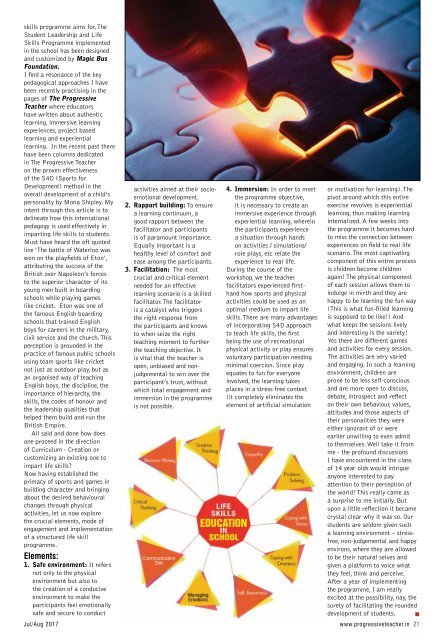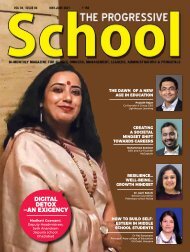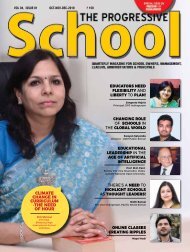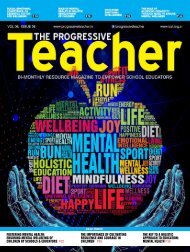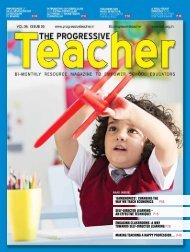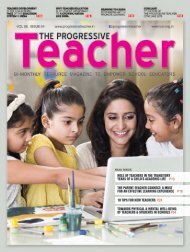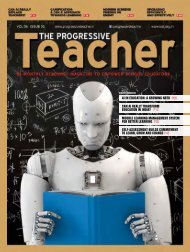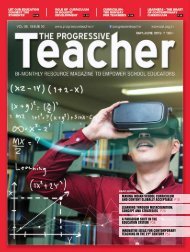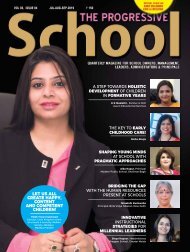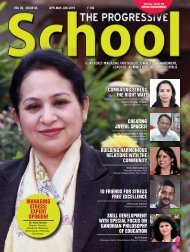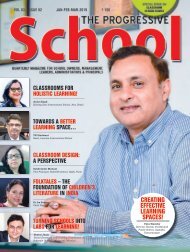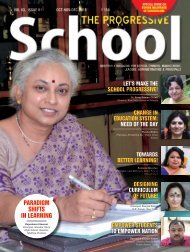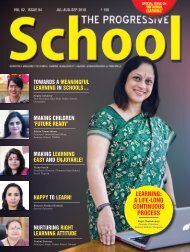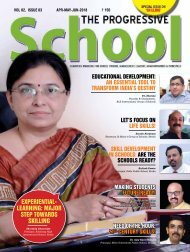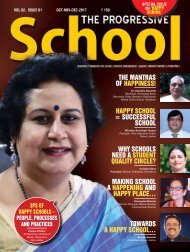The Progressive Teacher Vol 04 Issue 03
This issue of The Progressive Teacher focuses on "New Trends in Education ". In this edition, articles explore contemporary trends to enhance interactive learning amongst students.
This issue of The Progressive Teacher focuses on "New Trends in Education ". In this edition, articles explore contemporary trends to enhance interactive learning amongst students.
You also want an ePaper? Increase the reach of your titles
YUMPU automatically turns print PDFs into web optimized ePapers that Google loves.
skills programme aims for. <strong>The</strong><br />
Student Leadership and Life<br />
Skills Programme implemented<br />
in the school has been designed<br />
and customized by Magic Bus<br />
Foundation.<br />
I find a resonance of the key<br />
pedagogical approaches I have<br />
been recently practising in the<br />
pages of <strong>The</strong> <strong>Progressive</strong><br />
<strong>Teacher</strong> where educators<br />
have written about authentic<br />
learning, immersive learning<br />
experiences, project based<br />
learning and experiential<br />
learning. In the recent past there<br />
have been columns dedicated<br />
in <strong>The</strong> <strong>Progressive</strong> <strong>Teacher</strong><br />
on the proven effectiveness<br />
of the S4D (Sports for<br />
Development) method in the<br />
overall development of a child’s<br />
personality by Mona Shipley. My<br />
intent through this article is to<br />
delineate how this international<br />
pedagogy is used effectively in<br />
imparting life skills to students.<br />
Must have heard the oft quoted<br />
line ‘<strong>The</strong> battle of Waterloo was<br />
won on the playfields of Eton’,<br />
attributing the success of the<br />
British over Napoleon’s forces<br />
to the superior character of its<br />
young men built in boarding<br />
schools while playing games<br />
like cricket. Eton was one of<br />
the famous English boarding<br />
schools that trained English<br />
boys for careers in the military,<br />
civil service and the church. This<br />
perception is grounded in the<br />
practice of famous public schools<br />
using team sports like cricket<br />
not just as outdoor play, but as<br />
an organised way of teaching<br />
English boys, the discipline, the<br />
importance of hierarchy, the<br />
skills, the codes of honour and<br />
the leadership qualities that<br />
helped them build and run the<br />
British Empire.<br />
All said and done how does<br />
one proceed in the direction<br />
of Curriculum - Creation or<br />
customizing an existing one to<br />
impart life skills?<br />
Now having established the<br />
primacy of sports and games in<br />
building character and bringing<br />
about the desired behavioural<br />
changes through physical<br />
activities, let us now explore<br />
the crucial elements, mode of<br />
engagement and implementation<br />
of a structured life skill<br />
programme.<br />
Elements:<br />
1. Safe environment: It refers<br />
not only to the physical<br />
environment but also to<br />
the creation of a conducive<br />
environment to make the<br />
participants feel emotionally<br />
safe and secure to conduct<br />
activities aimed at their socioemotional<br />
development.<br />
2. Rapport building: To ensure<br />
a learning continuum, a<br />
good rapport between the<br />
facilitator and participants<br />
is of paramount importance.<br />
Equally important is a<br />
healthy level of comfort and<br />
ease among the participants.<br />
3. Facilitation: <strong>The</strong> most<br />
crucial and critical element<br />
needed for an effective<br />
learning scenario is a skilled<br />
facilitator. <strong>The</strong> facilitator<br />
is a catalyst who triggers<br />
the right response from<br />
the participants and knows<br />
to when seize the right<br />
teaching moment to further<br />
the teaching objective. It<br />
is vital that the teacher is<br />
open, unbiased and nonjudgemental<br />
to win over the<br />
participant’s trust, without<br />
which total engagement and<br />
immersion in the programme<br />
is not possible.<br />
4. Immersion: In order to meet<br />
the programme objective,<br />
it is necessary to create an<br />
immersive experience through<br />
experiential learning, wherein<br />
the participants experience<br />
a situation through hands<br />
on activities / simulations/<br />
role plays, etc relate the<br />
experience to real life.<br />
During the course of the<br />
workshop, we the teacher<br />
facilitators experienced firsthand<br />
how sports and physical<br />
activities could be used as an<br />
optimal medium to impart life<br />
skills. <strong>The</strong>re are many advantages<br />
of incorporating S4D approach<br />
to teach life skills, the first<br />
being the use of recreational<br />
physical activity or play ensures<br />
voluntary participation needing<br />
minimal coercion. Since play<br />
equates to fun for everyone<br />
involved, the learning takes<br />
places in a stress free context<br />
(it completely eliminates the<br />
element of artificial simulation<br />
or motivation for learning). <strong>The</strong><br />
pivot around which this entire<br />
exercise revolves is experiential<br />
learning, thus making learning<br />
internalized. A few weeks into<br />
the programme it becomes hard<br />
to miss the connection between<br />
experiences on field to real life<br />
scenario. <strong>The</strong> most captivating<br />
component of this entire process<br />
is children become children<br />
again! <strong>The</strong> physical component<br />
of each session allows them to<br />
indulge in mirth and they are<br />
happy to be learning the fun way<br />
(This is what fun-filled learning<br />
is supposed to be like!) And<br />
what keeps the sessions lively<br />
and interesting is the variety!<br />
Yes there are different games<br />
and activities for every session.<br />
<strong>The</strong> activities are very varied<br />
and engaging. In such a learning<br />
environment, children are<br />
prone to be less self-conscious<br />
and are more open to discuss,<br />
debate, introspect and reflect<br />
on their own behaviour, values,<br />
attitudes and those aspects of<br />
their personalities they were<br />
either ignorant of or were<br />
earlier unwilling to even admit<br />
to themselves. Well take it from<br />
me - the profound discussions<br />
I have encountered in the class<br />
of 14 year olds would intrigue<br />
anyone interested to pay<br />
attention to their perception of<br />
the world! This really came as<br />
a surprise to me initially. But<br />
upon a little reflection it became<br />
crystal clear why it was so. Our<br />
students are seldom given such<br />
a learning environment – stressfree,<br />
non-judgemental and happy<br />
environs, where they are allowed<br />
to be their natural selves and<br />
given a platform to voice what<br />
they feel, think and perceive.<br />
After a year of implementing<br />
the programme, I am really<br />
excited at the possibility, nay, the<br />
surety of facilitating the rounded<br />
development of students.<br />
Jul/Aug 2017<br />
www.progressiveteacher.in 21


